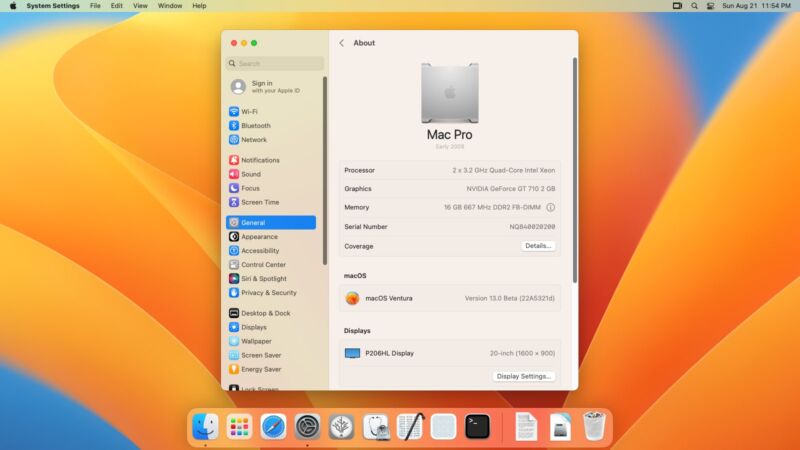
Skirting the official macOS system requirements to run new versions of the software on old, unsupported Macs has a rich history. Tools like XPostFacto and LeopardAssist could help old PowerPC Macs run newer versions of Mac OS X, a tradition kept alive in the modern era by dosdude1's patchers for Sierra, High Sierra, Mojave, and Catalina.
For Big Sur and Monterey, the OpenCore Legacy Patcher (OCLP for short) is the best way to get new macOS versions running on old Macs. It's an offshoot of the OpenCore Hackintosh bootloader, and it's updated fairly frequently with new features and fixes and compatibility for newer macOS versions. The OCLP developers have admitted that macOS Ventura support will be tough, but they've made progress in some crucial areas that should keep some older Macs kicking for a little bit longer.
What’s different about Ventura?
In some past years, the hardware differences between "supported" and "unsupported" Macs could be so small that the only thing you'd need to do to boot new macOS versions is trick the bootloader into thinking it was running on a slightly newer Mac. But this approach has gotten more difficult as Apple removes more and more Intel Mac support from macOS.
OCLP and the dosdude1 patchers could usually lean on some older-but-officially-supported models to extend support to unsupported Macs with similar hardware. In macOS Monterey, for example, Apple had officially dropped support for a whole lot of 2012, 2013, and 2014-era Mac models that used Intel's 3rd-generation (Ivy Bridge) and 4th-generation (Haswell) CPUs. But because Monterey continued to support the Ivy Bridge-powered 2013 Mac Pro and the Haswell-powered 2014 Mac mini, the OS still retained some baseline level of support for those processors (and accompanying GPU and chipset hardware) that made it easier to get Monterey running on other Macs with the same chips.
Ventura is different. It doesn't officially support any Intel CPUs older than the 7th-generation ("Kaby Lake"), and Apple has actually done a lot of cleanup behind the scenes to remove drivers and other OS components that Macs with older processors relied on. That includes GPU drivers for older Intel and AMD GPUs, the last vestiges of macOS's native Nvidia GPU driver support, USB support for many older models, support for non-Force Touch trackpads, drivers for Intel Ethernet controllers, and more.
And the changes run deeper than drivers. Apple has also removed support for older x86 processors that don't support the AVX2 instruction set, keeping the OS from booting at all on CPUs without those instructions. AVX2 was introduced in Haswell CPUs, which adds another hurdle for anyone hoping to run Ventura on anything older.
Apple has also changed the Metal rendering stack in ways that leave it incompatible with the Monterey-era drivers for older GPU hardware (this is apparently totally unrelated to the Metal 3 updates; Ventura officially supports many Macs that are only compatible with Metal 2). If you add the old drivers back in, you get basic display output with no graphics acceleration. The full list of hurdles that developers will need to clear to run Ventura on unsupported Macs is tracked on the OpenCore Legacy Patcher's Github repository.
Signs of progress
After many months of work, we’ve finally gotten macOS Ventura running on legacy Metal GPUs!
— Mykola Grymalyuk (@khronokernel) August 22, 2022
This includes my early 2008 Mac Pro (Nvidia Kepler and AMD GCN 1), 2012 Mac mini, 2014 Mac mini and 2014 5k iMac! pic.twitter.com/cMQ5Qk8uoo
That Github post is a bit downbeat about the future of Ventura support on those older machines. "Looking at all the issues in front of us, I don't believe there's any short-term possible fixes for the community to use," wrote project lead Mykola Grymalyuk in June. "Best time frame would be 6 months from now when a proper build of OpenCore Legacy Patcher can be released, but even this is difficult to promise."
But progress has been made, despite that initial pessimism. First, while macOS doesn't technically include system files for pre-AVX2 Intel CPUs, Apple's Rosetta 2 software does still include those files, since Rosetta 2 emulates the capabilities of a pre-AVX2 x86 CPU. By extracting and installing those files in Ventura, you can re-enable support on Ivy Bridge and older CPUs without AVX2 instructions.
And this week, Grymalyuk showed off another breakthrough: working graphics support on old Metal-capable Macs, including machines as old as the 2014 5K iMac, the 2012 Mac mini, and even the 2008 cheese grater-style Mac Pro tower.
The OCLP team still has other challenges to surmount, not least of which will involve automating all of these hacks so that users without a deep technical understanding of macOS's underpinnings can continue to set up and use the bootloader. Grymalyuk still won't speculate about a timeframe for official Ventura support in OCLP. But given the progress that has been made so far, it seems likely that people with 2012-and-newer Macs should still be able to run Ventura on their Macs without giving up graphics acceleration or other important features.
reader comments
68